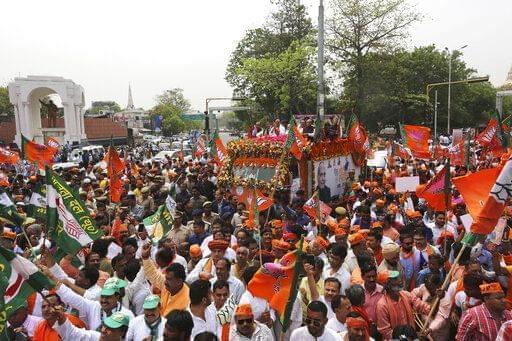Indian Elections; New Trends In Meat Consumption; How To Make Your Garden Pollinator-Friendly

Indian Home Minister Rajnath Singh, center on truck, acknowledges the crowd as he arrives to file his nomination papers for the upcoming general elections in Lucknow, India, Tuesday, April 16, 2019. India's elections, the world's largest democratic exercise, will take place on seven days over a six-week period. Vote counting is scheduled for May 23. AP Photo/Rajesh Kumar Singh
The world’s largest democracy is holding elections right now. And even though India is thousands of miles away, many Illinoisans are paying close attention. Plus, are you trying to cut back on meat? Well, there’s a growing market for burgers that taste like it, and look like it, but are entirely plant-based. And as you ready your garden for spring, how ready it is to attract pollinators?
900 million people in India are eligible to cast their ballots in this year’s elections. Voting is actually taking place right now and it will continue until May 19th, and ballots will be counted on the 23rd. There’s a lot at stake in India’s elections, and the results affect not just Indian residents, but South Asians, and people around the world, including here in Illinois. Asian-Americans are the fastest growing demographic in our state and in the country, and within that South Asians are the largest group in Illinois. There are more than a quarter of a million, about 270,000, residents of South Asian descent in Illinois. The Hindu World Congress was even held in Lombard, Illinois last year. But so many Illinoisans, whether it’s university students in Champaign-Urbana or longtime diaspora members whose parents immigrated from India to Chicago a generation ago, are keeping a eye on how this goes.
We’ve gathered a few of those people in Illinois who are watching closely. Harish Patel joins us from Chicago, where he’s the founder of the Chicago Votes Action Fund. Dipesh Chakrabarty is a distinguished professor of South Asian History at the University of Chicago. And Rasheed Ahmed is the former president of the US-India policy Institute, and the former president of the Indian American Muslim Council. He joins us from the Chicago suburbs.
"The shape of India is at stake ... this election is going to determine is India's future as a secular republic that embraces pluralism and adheres to the founders' notion that India's unity is strengthened by its diversity."
— The 21st (@21stShow) April 17, 2019
More from @lfrayer here: https://t.co/7Hqxw7r7vU
And -
Imagine sitting down at your favorite burger place. Toasted bun, crispy lettuce and juicy patty all stacked up and ready for you to take a big bite. Except, even though it looks like beef, and might even bleed like beef, it’s not beef at all. Plant-based patty’s are the latest fast food trend, and St. Louis Burger King’s are joining the meatless market with their ‘impossible whoppers.’ The name comes from California company Impossible Foods which provides plant patty’s to more than 5,000 restaurants nationwide, including almost 600 here in Illinois. At the same time, companies across the country are developing lab grown meat. That's real meat made in a lab from animal cells. Both meat-less and lab grown industry’s have gained support from consumers concerned about the environmental costs of raising and consuming meat. So are these rapidly expanding markets making the need for beef, obsolete?
Olga Khazan joins us on the show for more. She’s been reporting on this for The Atlantic. Louisa Chu is also with us, she’s a Chicago Tribune food critic and Co-Host of the Chewing Podcast.
"We like meat to taste a certain way, but I realized that if I had never before had chicken, I might prefer this. Why is gaminess a virtue, anyway?" More from @olgakhazan below: https://t.co/1lyFMgu4ee
— The 21st (@21stShow) April 17, 2019
Plus -
Last week, we talked about an unfortunate designation with the city of Chicago when it comes to migrating birds. It’s the deadliest big city in the country for bird deaths while migrating, and that's largely because of the city’s lights. So here’s a more encouraging number: it turns out that Chicago has the second-highest registered gardens for the pollinators butterflies and bees. Why is this important and how can you do this in your garden?
Greg Spyreas is back in studio with us to answer this question. He’s a research scientist with the Illinois Natural History Survey. Mary Phillips is in Washington, DC where she’s the lead cooridinator for the National Pollinator Garden Network.
Try viburnum, box elder, a maple tree or geraniums says Mary Phillips from @NPGN3. Mary Phillips tells gardeners who want to ready their garden for pollinators to think about planting for 3 seasons.
— The 21st (@21stShow) April 17, 2019
"Many of them berry so you're also supporting the bird population." pic.twitter.com/RS9nRAWEf3

